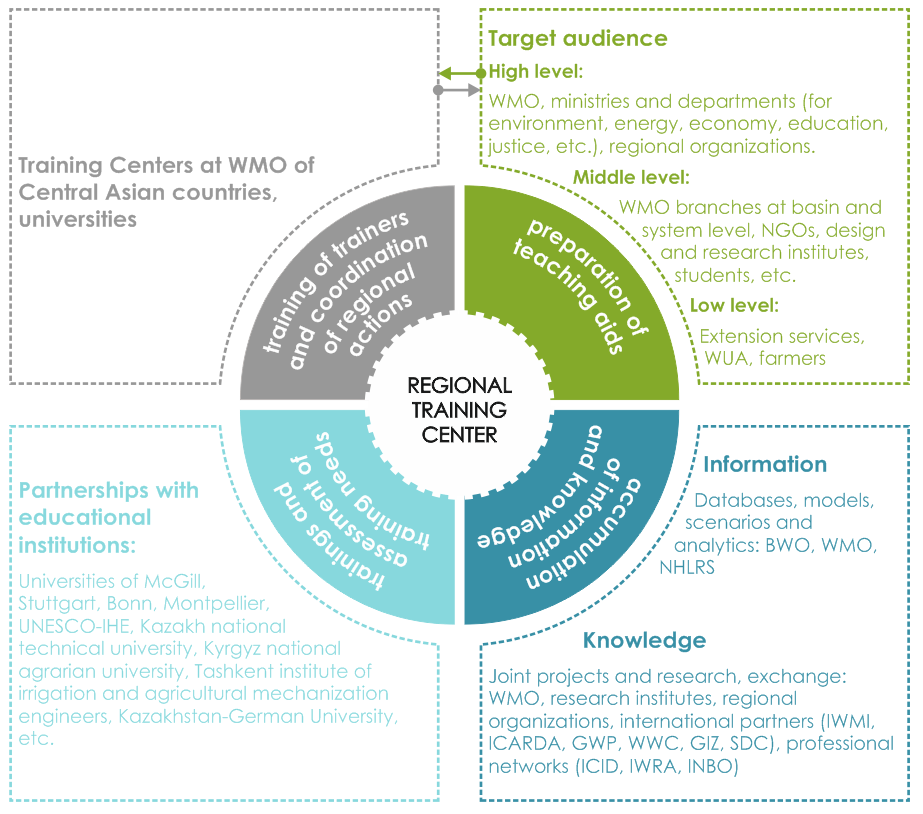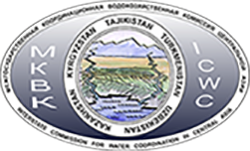Main Activity
The System of Water Planning and Real-time Management
ICWC through its executive bodies – BWO Amu Darya and BWO Syr Darya – implements measures and procedures to ensure equitable and reasonable water distribution along interstate sources, with due account of environmental demand and future development needs. This is done in cooperation with the Coordination Dispatch Center “Energy” (CDC “Energy”) and national energy ministries and departments.
Close attention is paid to automation of water-management infrastructure. With the financial support of international partners, the automated control and monitoring systems were put into operation at head structures of Dustlik Canal (CIDA), Upper Chirchik waterworks facility (USAID), Uchkurgan waterworks facility and the whole set of head structures operated by BWO Syr Darya in the Fergana Valley (SDC). Similar systems were completed along three pilot canals in Uzbekistan, Kyrgyz Republic and Tajikistan (SDC).
Information and Analytics
ICWC informs decision makers, experts and general public about its activities via its official web-site and the Portal of Knowledge for Water and Environmental Issues in Central Asia - CAWater-Info.
CAWater-Info is a system supporting decisions in the area of water management in the Aral Sea Basin. It allows making informed decisions on real-time management at all levels of water hierarchy and build scenarios and trends of regional development for mid- and long-term.
Key information on the portal is collected and processed by SIC ICWC in cooperation with BWO Amu Darya and BWO Syr Darya. Information partners of the portal also include other IFAS bodies, national departments, international and non-governmental organizations.
The ICWC executive bodies take active part in activities of a coordination group for development of the common water and environment information space in CA. The coordination group was formed in 2014 with the support of the UN Economic Commission for Europe to develop the regional platform for more effective information management and decision making by founding states and bodies of IFAS.
Recently, ICWC has started using in its activities the products of geoinformation systems (GIS). GIS-technologies substantially ease monitoring of water resources, agricultural land and hydraulic structures.
Task Forces and Think Tanks for Drafting of Policy and Normative Legal Documents
In the course of ICWC activity, task forces and think tanks were formed among representatives of the member states to solve various issues.
The task forces prepared and submitted to ICWC or member countries for consideration a number of important policy papers that laid the basis for deepening of water cooperation in CA. Such documents include, in particular, the Concept on addressing the Aral Sea and Prearalie problem, with account of regional socio-economic development; Basic provisions of the Regional Water Strategy; Key approaches to strategic planning of transboundary water use.
ICWC devotes great care to drafting of new agreements and revision of existing ones on transboundary water management and flow regulation by reservoirs and hydroschemes. For example, in 2005-2008, with the ADB support, five national intersectoral work groups and regional task force undertook great efforts for elaboration of new draft “Agreement on the use of water and energy resources in the Syr Darya River Basin” and “The rules for fulfillment of procedural obligations and recommendations for improvement of water and energy regulation and management in the Syr Darya River Basin”. Those documents were discussed repeatedly at ICWC meetings and approved in general. However, the approval and signature process have not been finished at country levels.
A draft “Agreement on information and analytical support to comprehensive water management, use, and protection in the Aral Sea Basin and organization of interstate information exchange” is currently under review by the countries. The work on the draft Agreement was started as part of the Second Aral Sea Basin Program (ASBP-2) and continued in 2013-2014 by ICWC.
The 63rd ICWC meeting (Tashkent, April 2014) approved and recommended for implementation the Implementation Plan on strengthening ICWC activities in key directions, which included four items:
I. Water saving.
II. Implementation of IWRM as a “green growth” tool for development and climate change adaptation.
III. Improvement of quality and accuracy of water accounting.
IV. Building of capacities of regional and national organizations through training development.
For implementation of the Plan, respective work groups were formed and gathered at their first meetings in 2017.
Joint Regional Projects and Research
ICWC coordinates and controls implementation of joint research efforts for scientific and technical support to address regional water issues and of regional projects, with the use of available scientific capacities of the State-Founders, and promotes the results achieved.
In 1994, the Research plan of SIC ICWC was elaborated and implemented in cooperation with national research institutes in CA and with the financial support of national water agencies.
The ICWC executive bodies also implement regional projects through grants. Such projects allowed forming specific manner of joint work among water experts and water users at middle and lower level of water hierarchy that evolved in generally accepted tradition of exchange and interaction and mutual learning for uptake of new ideas in the regional water sector.
Publications
Publication activity is an important part in the work of ICWC executive bodies. The information gathered from various sources is processed by SIC ICWC and disseminated among the CA countries in form of: ICWC bulletins; information and legal collections; abstracts review; collections of scientific papers; press releases; workshop and conference proceedings; manuals; guidelines; monographs; and other publications.
Professional Development and Training
Professional development and training system, which takes into account local specifics and covers all levels of water hierarchy, was established within ICWC. This system is to transfer knowledge and skills and shape new thinking and attitudes towards water.

International Cooperation
ICWC and its executive bodies take an active role in extending exchange on water issues with leading countries and are engaged in the work of recognized international organizations and forums.
ICWC maintains active cooperation with international partners, such as the World Bank, Asian Development Bank, United Nations Development Program, UN Economic Commission for Europe, UNESCO, FAO, UN Regional Center for Preventive Diplomacy in Central Asia, USAID, GIZ, SDC, KOICA and many others.
To get acquainted with best practices in water management and irrigation, ICWC members and experts of executive bodies took part in study tours to France in 1994 (supported by the World Bank); to Italy and Belgium in 1995 (European Union); to USA and Canada in 1996, 1997, and 1998 (CIDA) and in 2000 (CIDA and USAID); to Spain in 1998 (European Union); to Israel in 1995, 1997 (Israeli Government and World Bank); to India in 1999 (Indian Government); and to Pakistan in 1999 (Swiss Agency for Development and Cooperation). The study tours for water sector employees were organized also to Australia (2006), Turkey (2008), and Spain (2010).
Cooperation is extended and enhanced with such recognized organizations as the World Water Council (WWC), International Network of Basin Organizations (INBO), Global Water Partnership (GWP), International Water Resources Association (IWRA), International Commission on Irrigation and Drainage (ICID). ICWC delegation took active part in the work of all World Water Forums as well.
Close relationships with ICID contributed much to acquaintance with the advanced international practices in irrigation and drainage and to information exchange. A special team was established at ICID for the Aral Sea problems. ICWC delegations have participated in the work of all ICID congresses since 1993.

